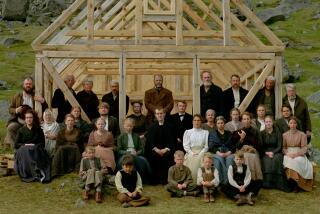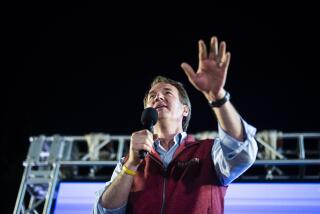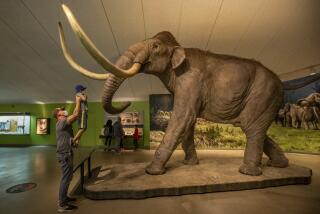Great Danes
- Share via
The vikings clawed their way back into the national conversation recently, and for those of us who believe they have never gotten their historical due, it was not a moment too soon. Last heard from when they unexpectedly popped up on horseback in last winter’s anachronistic, factually suspect action film “Pathfinder” -- a rip-roaring affair that sadly found only a negligible audience -- the Vikings often go whole decades without being talked about in any meaningful way on these shores.
All that changed a few weeks back when the Wall Street Journal published an essay on the subject of global warming by environmental sciences expert Daniel B. Botkin. Throwing down the gauntlet in the wake of the Nobel committee’s surprise decision to award Al Gore its coveted Peace Prize, Botkin kicked off his piece with this plucky assertion: “Global warming doesn’t matter except to the extent that it will affect life -- ours and that of all living things on Earth. And contrary to the latest news, the evidence that global warming will have serious effects on life is thin. Most evidence suggests the contrary.”
To buttress this admittedly controversial theory, Botkin, president of the Center for the Study of the Environment and professor emeritus in the Department of Ecology, Evolution and Marine Biology at UC Santa Barbara, cited studies proving that global warming would not result in huge numbers of species disappearing, would not result in an epidemic of tropical diseases and would not result in a catastrophic change in the way humans lead their lives. While not denying the reality of global warming, Botkin said that its effects have been vastly exaggerated, and that people should worry more about species disappearing forever because of deforestation in the rain forest rather than global warming in the Arctic.
But the real haymaker, coming right out of left field, was his contention that global warming would not necessarily be a disaster for humanity. Citing Emmanuel Le Roy Ladurie’s “Times of Feast, Times of Famine: A History of Climate Since the Year 1000,” one of those books that we all have on our nightstands but never seem to find the time to read, Botkin pointed out that it was the warming that occurred between 750 and 1230 that encouraged the Vikings to break out of their harsh climate and sail west. Particularly impressive were Erik the Red’s voyages, resulting in the colonization of the previously inaccessible and inhospitable Iceland and Greenland. Chortled Botkin: “Good thing that Erik the Red didn’t have Al Gore or his climatologists as his advisors.”
Those of us who adore Viking lore, those of us who never cease to marvel at their daring exploits, those of us who resent the way the first Europeans to set foot in North America have been completely upstaged by Christopher Columbus, John Cabot, Ponce de Leon and the rest of those over-praised Johnny-come-latelies cannot help feeling a frisson of glee -- nay, vindication -- now that Botkin has gone where no Op-Ed page contributor, not even in the Journal, has gone before and singled out the voyages of the Vikings as a reason to stop being obsessed with global warming. Never in our wildest dreams did any of us seriously expect the Vikings to enter the global warming debate, not only because they have not been heard from for almost 1,000 years but because of their behavior.
Admittedly, the Vikings were a smidgen coarse, a tad on the rough side, occasionally pug-ugly. True, they were known to raid small towns in England and Ireland, kill all the men, rape all the women, eat all the food, steal all the gold and then disappear for a few years, giving survivors time to rebuild the towns, then come back and do the same things all over again. Admittedly, they were known to cook victory meals on spits planted in the bodies of their disemboweled victims. Admittedly, they liked to toss captives into pits filled with venomous snakes. Admittedly, they took particular delight in razing beautiful churches. And, yes, admittedly, the surprise Viking raid on the monastery of Lindisfarne in 793 was thought at the time to be the worst thing to happen in Europe since the fall of the Roman Empire. So not everyone would instinctively turn to the saga of the Vikings as an example of how global warming could benefit mankind.
But that is not the point Botkin wishes to make. Even with all their oafish failings, the Vikings embodied a can-do, up-and-at-’em mentality that staid, decadent Europe had not witnessed in hundreds of years. The Vikings didn’t sit around complaining that the ice was melting and that their coastal communities were falling into the sea; the Vikings got up off their duffs and went out and did something about it. The Vikings had guts, panache, ingenuity, chutzpah -- all the virtues so lacking in Gore’s pitiful 2000 presidential campaign. What Botkin seems to be saying is that even if the globe does continue to heat up, its fallout won’t be all bad because, if nothing else, it will unleash the untapped entrepreneurial spirit lurking in so many of us, the bold, roll-up-your-sleeves attitude that helped the Vikings conquer vast portions of the Western world.
Even those of us who adore those feisty Scandinavian sea dogs admit that their methods were sometimes cruel, their actions sometimes less than classy. That is not the point. The Mayans and the Etruscans saw the glass as half-empty and disappeared forever. The Vikings saw the glass as half-full and established a commercial empire that ultimately stretched all the way from Greenland to Moscow. A little bitty thing like global warming wasn’t going to wreck their weekend.






